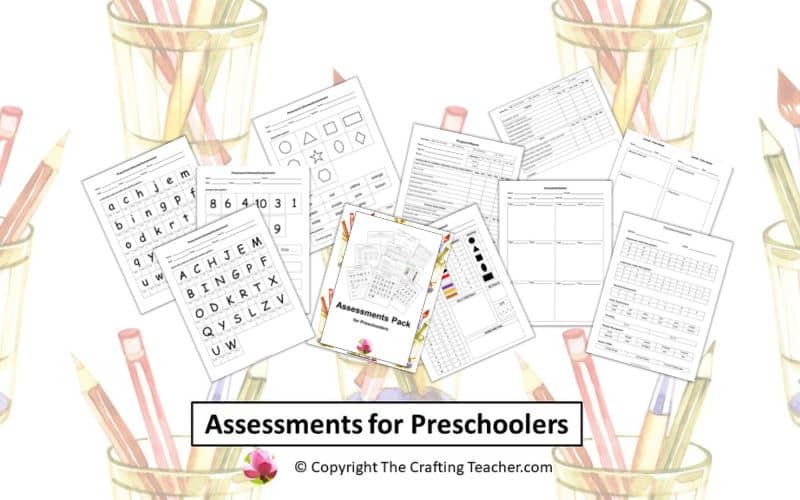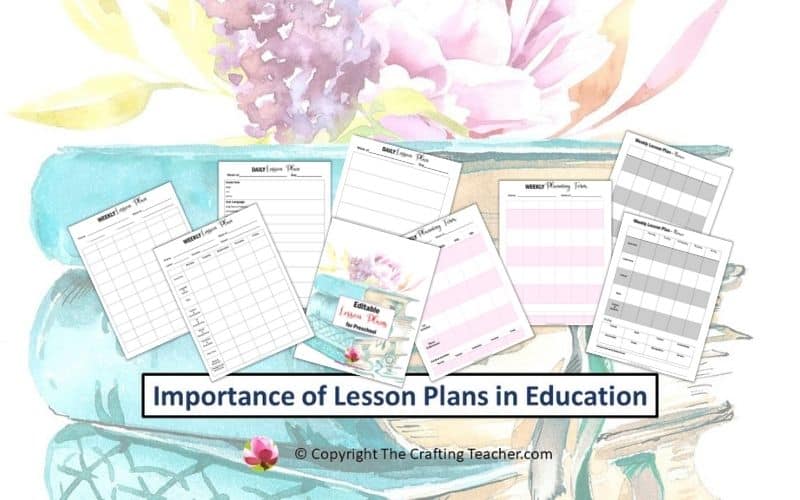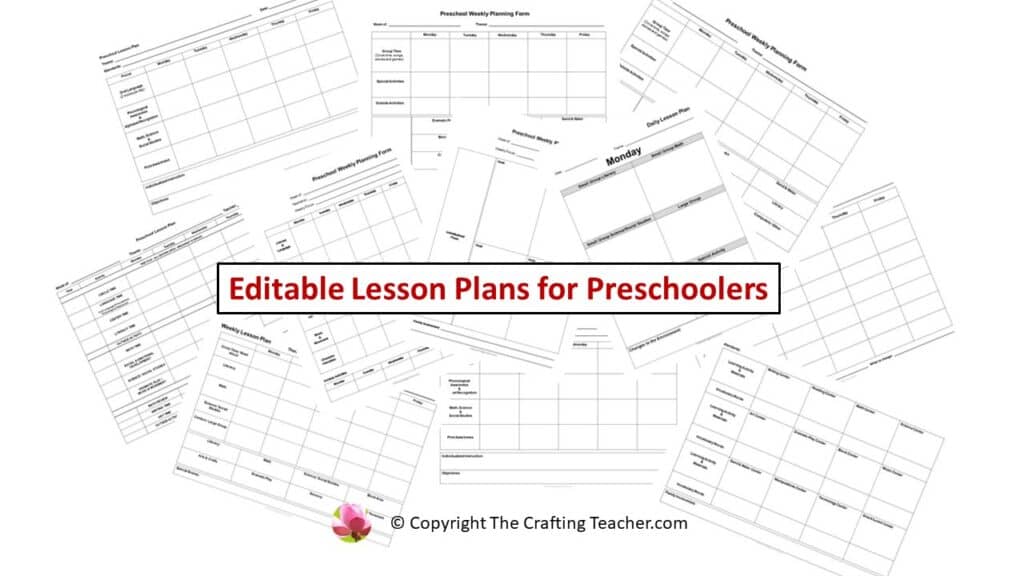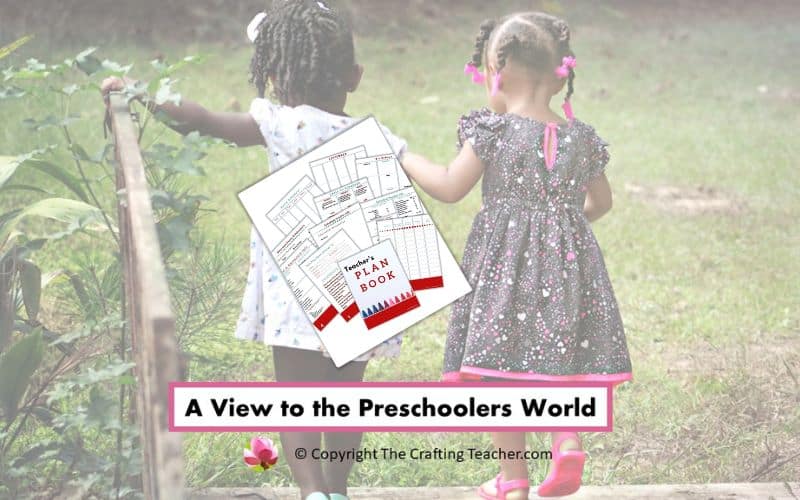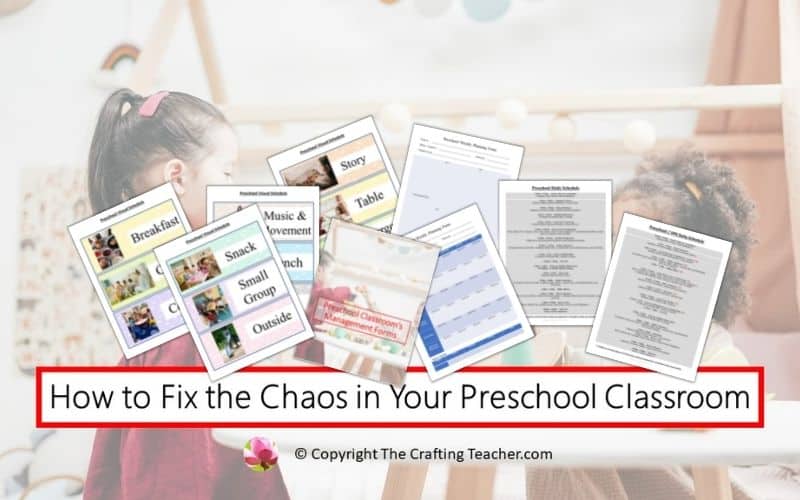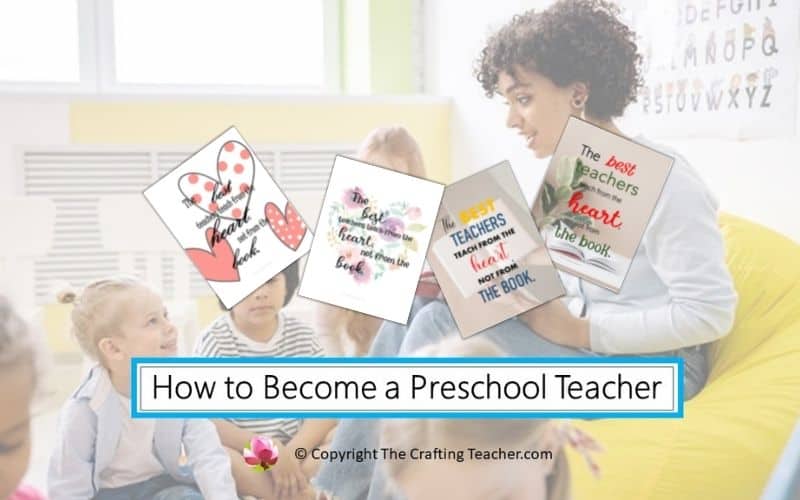Assessments For Preschoolers
Affiliate Disclosure: “This post contains affiliate links, which means I receive a small commission, at no extra cost to you, if you make a purchase using those links.”
The Assessments for Preschoolers is a very useful way for teachers and parents to know the developmental level of their children, not only academically but also physically, mentally, and emotionally, to follow each child’s progress, and to design individual activities to help each child reach the benchmarks at every stage of his or her life.
To do this in a more accurate way the best practice is to use assessments since they provide an incredible amount of useful information about each child’s progress and needs regarding key skills that need to be developed to ensure his or her school readiness.
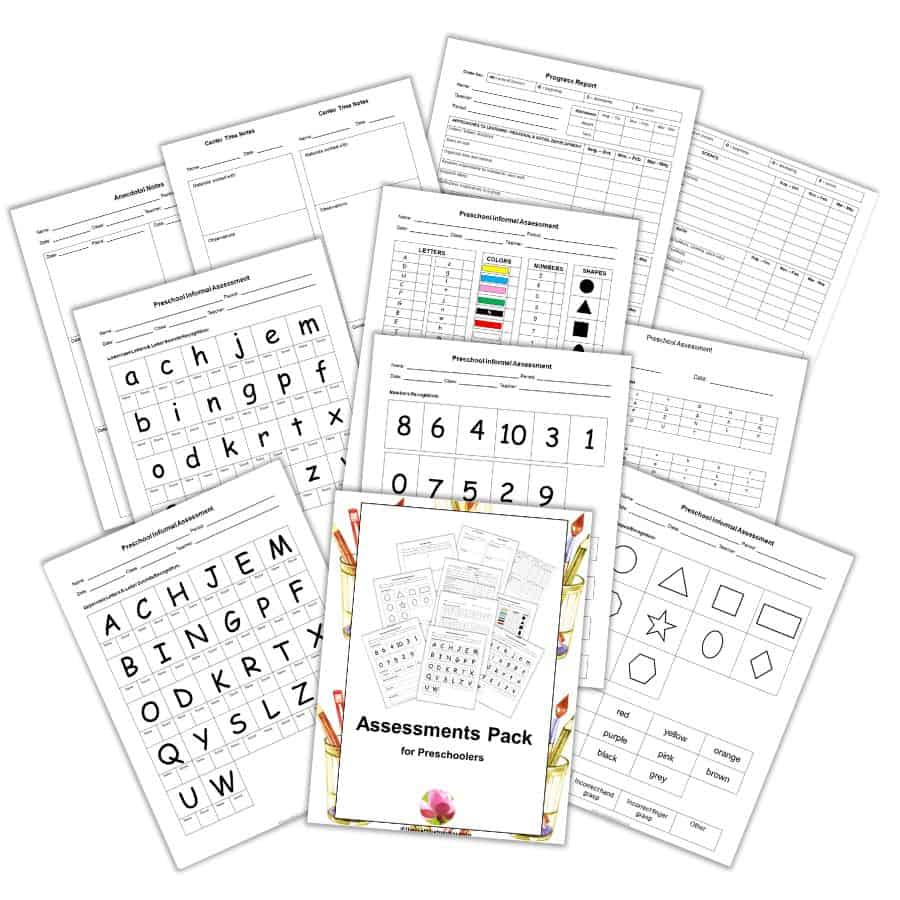
This post contains a 10-page long FREE set with six different types of informal assessment templates, two anecdotal notes templates, and one progress report, which can be found at the end.
What Are Assessments In Preschool
An assessment is a tool designed to check the level of development of a child when he or she comes to your classroom, and when used regularly will track the progress of that child throughout the year, and what skills they should focus on to help the child develop the right skills for his or her age.
Assessments are also great to check if your curriculum and/or lesson plans are effective or need to be modified and to give parents the correct overview of their child’s developmental stage and skills during teacher-parent conferences.
Importance of Preschool Assessments
Certain milestones are expected for preschoolers to develop at each stage. Of course, every child is unique and not all of them develop all these skills simultaneously, but it is important to know if each child is learning those skills at the right pace.
Since tests are completely inappropriate for this young age, the type of assessments preschool teachers rely on are their observations which should be documented. The information gathered will help teachers and parents:
- Find out how each child is progressing developmentally; in other words, what skills he or she has developed, and in what areas that child needs help to reach the next milestone.
- What are the different strengths the children have, and what is their preferred style of learning?
- Provide the information about which child might have a learning disability or impediment that needs a professional diagnosis, to get the benefit from special needs assistance.
- Collect samples of what each child is capable of at the moment to maintain the parents well-informed about their child’s progress and needs.
- Provide feedback to teachers and administrators about what things are working or not, to find better ways to support their preschoolers’ learning process more effectively.
Types of Assessments in Preschool
Observations
This is a type of informal but very helpful assessment to be used every day. When you watch how a child does different tasks, interacts with the teacher and friends, and demonstrates the different skills he or she has already developed, you can find out the child’s abilities. You can also ask the child to perform a particular task such as identifying letters, shapes, and numbers, or write his or her name, and take notes about your observations on those particular tasks.
Some of the most common skills preschool teachers usually observe throughout the year are:
- Recognition of colors.
- Math skills, including recognition of shapes, numbers 1 to 10, ability to count and do puzzles, and simple addition and subtraction operations.
- Fine and Gross motor skills, including eye-hand coordination, drawing, tracing, painting, running, playing with blocks, dancing, jumping, etc.
- Social and emotional skills, including taking turns, making friends, respecting other people’s spaces, sharing, cooperating, etc.
- Language, literacy, and auditory development, including how the child can follow and tell a story, pronounce words, have conservation, recognize letters, follow directions, and expresses his or her thought, needs, and desires.
- Self-awareness skills, including knowledge of personal information such as his or her full name, name of parents and teachers, address, phone number, and names of pets.
It is a good practice to record this observation in an Anecdotal Form, to make sure you don’t forget.

Portfolios
Since portfolios store anecdotal notes, samples, photographs, assessments, and teacher-parent conference results of a child’s overall performance, going through those gives you an idea about what tasks the child can perform, and where he or she needs help. Also, if you ask the child to perform the same tasks multiple times throughout the year, you can see the child’s progress on those particular tasks.
Parent’s Input
Having the parents’ input regarding their child not only provides you with information about their child’s abilities, personality, reactions, etc., that you might not see at school, but also help you to create a partnership between your parents based on trust and a desire to reach a common goal which is to help their child develop to his or her full potential.
Checklists and Rubrics
Checklists and rubrics can be provided by the curriculum you’re using or the state or done by you focusing on the specific skills you want to evaluate.
As its name indicates, the checklist is a list of skills you want to evaluate the child on, and you just have to write a checkmark next to the task the child can perform already.
The rubrics, however, use a scale with three levels for each skill. For these, you can use different indicators such as numbers (1, 2 & 3), letters (N = not yet, S = sometimes, and A = always), or any other type that fits your classrooms, but always taking into consideration that the lowest level means the child doesn’t perform that specific task, the middle one means that the child performs that task sometimes, and the highest means that the child mastered that task.
This type of assessment should be done multiple times throughout the year, to be able to see if the child is progressing in learning the skills or not.
Formal Assessments
In Florida, the Early Learning Coalition provides early learning schools the information about the type of assessments they want the teachers to use. Until this year we use the Ages and Stages Questionnaire (ASQ) in all preschool classrooms. This year they want us to use Florida’s Assessment of Student Thinking (FAST) using Star Early Literacy for the VPK program or 4 years old children.
Unfortunately, I cannot speak for the entire country or other countries, since they might be different. That is why I will suggest you research what type of assessments your county or country wants you to perform if you don’t know it yet.
How to Administer Assessments in Preschool
The first thing you need to find out is if parental consent to administer the assessment to preschoolers is mandatory in your area. Here in Florida is not, but I like to inform the parents that it’s going to happen anyways and that we will share the results with them during teacher-parent conferences. We like to perform ASAQs three times a year, and we always send a package home for them to do. That way we can compare results and have a broader picture of each child’s abilities and skills.
The observations and use of portfolios should be a normal practice in the day-to-day routine of any preschool teacher. However there should be one formal assessment at the beginning, middle, and end of the school year, to have a better understanding of each child and their class progress, and in what areas need more focus.
Some people say that the director should be the one administering the assessments, and observing the children make changes based on the results. I don’t agree with that, because I think that watching the children for a short period is not enough. In my opinion, the teachers are the ones with the children at all times and they are the ones capable of doing constant and accurate observation of their children.
The formal assessments should be done in a positive and relaxed environment, where the preschoolers feel relaxed. Otherwise, if this time turns into a stressful experience for them, the results might not be accurate.
Using Assessments to Create Individualized Lessons
Since not all children develop the same skills at the same time, a preschool teacher should use the results of the assessment to tailor each child’s individualized lessons to meet the needs of each of her children, detect any deficiency that needs attention, and inform parents of the situation, providing them with resources that will help the child improve those skills, which will also help the teacher as well.
This is also true for children that are above the expectations for their age, in which case the teacher can encourage the child to continue his or her growth, instead hold him or her back.
Conclusion
Preschool teachers should always remember that each child is unique, developing and learning at his or her speed. Also, not all children might master all the desired skills before going to kindergarten.
This means that in a class it is normal to find children developing skills at different times, and this should not worry the teachers unless a child is falling too far behind or is showing signs of some type of disability.
Preschool assessments are an excellent tool for early childhood programs, to make sure that teachers identify the progress of all their children, and that they receive the help and care they need to be successful.
The first assessment should be performed at the beginning of the year to identify each child’s developmental level and create a baseline for the development of lesson plans and future assessments.
It is recommended that teachers perform a combination of formal and informal assessments to have a better picture of each child’s skills, to be able to improve her teaching efforts, and create developmentally appropriate lessons, with activities designed to benefit the entire group and each child’s individual needs and create a learning environment to enrich the children’s learning experience, especially for those with special needs.
Preschool teachers should involve their children’s parents in the process not only to create a partnership and exchange reliable and important information and guide parents on an appropriate course of action based on the results of the assessment, and involve another specialist such as a speech and/or occupational therapist, psychologist or psychiatrist, to help children develop to their full potential.
Finally, these results should be included in the children’s portfolios that will go with them to the next class or new school, providing valuable information regarding the children’s developmental level, and which are their strengths and weaknesses. This will help the next teacher adapt her lessons and materials to cater to the children’s needs.
Pin It For Later
If you don’t have the time to check these ideas but want to save them for when you do, pin them to one of your Pinterest boards.
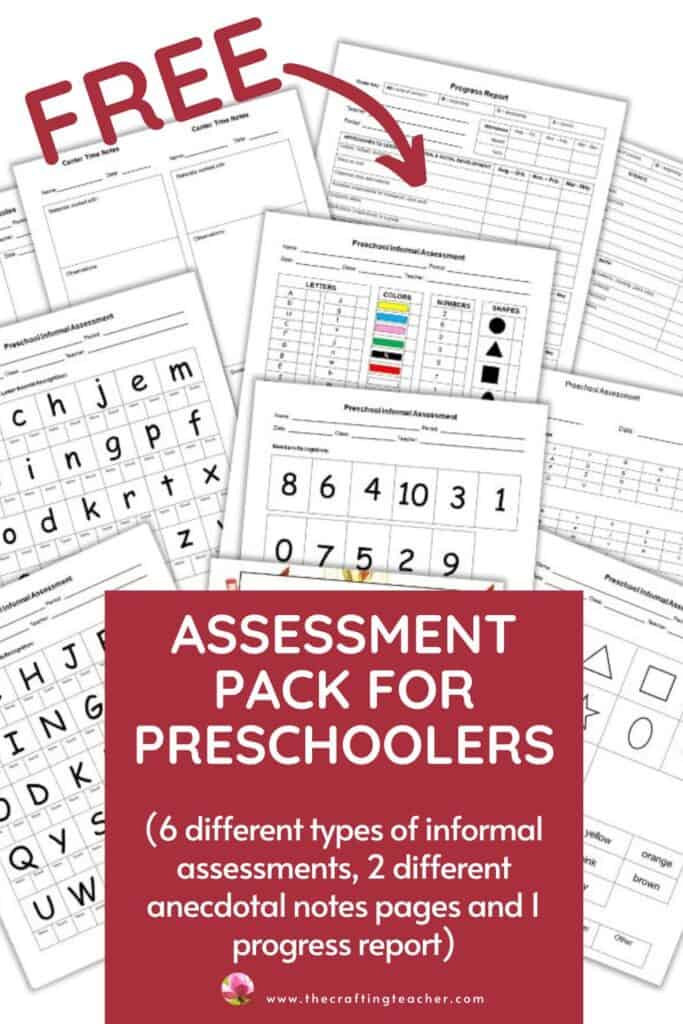
Good luck to you, and don’t forget to download your FREE Editable Assessment Pet, as a token of my appreciation for visiting my post. You just have to click on the bottom below and type your information, for an immediate download.
Be happy, safe, and creative. I wish you well.
Love,

P.S. Your feedback is really important to me because my goal is to always create things that you will find useful. Please let me know if you like the activity, or if you think I have to change something.

